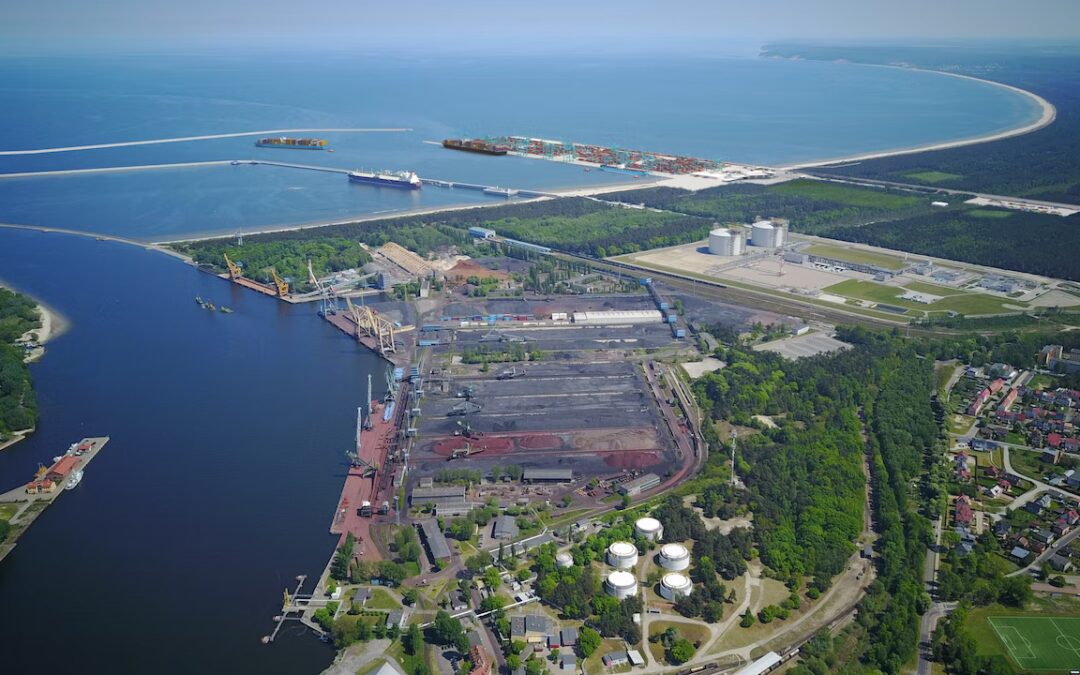Keep our news free from ads and paywalls by making a donation to support our work!

Notes from Poland is run by a small editorial team and is published by an independent, non-profit foundation that is funded through donations from our readers. We cannot do what we do without your support.
A planned new deepwater container port in northwest Poland has received final environmental approval after a legal challenge by an NGO from neighbouring Germany was rejected.
Construction of the port – located in the city of Świnoujście within a protected nature reserve near the border with Germany – is now expected to be completed in 2028 or 2029, providing “a huge boost for the economy”, says deputy infrastructure minister Arkadiusz Marchewka.
But the project, initiated under the former Law and Justice (PiS) government, has raised concern in both Germany and within Świnoujście itself, whose mayor also launched a legal challenge against it, in particular over its potential environmental impact.
Jest ostateczna decyzja środowiskowa dla Terminala kontenerowego w Świnoujściu!⁰⁰Zaskarżenie przygotowane przez https://t.co/4lbu32Wt8n. niemiecką organizację pozarządową nie zostało uwzględnione i uzyskaliśmy ostateczną decyzję środowiskową. Kolejny bardzo ważny krok w…
— Arkadiusz Marchewka (@A_Marchewka) February 3, 2025
“There is a final environmental decision for the container terminal in Świnoujście,” Marchewka announced on social media on Monday. “The appeal prepared by, among others, a German NGO was not accepted and…another very important step in the implementation of the investment has been made.”
“When the terminal is put into service, it will handle the world’s largest container ships,” he added. “We have a great boost for the economy ahead of us, but also a strengthening of the country’s broadly understood security.”
The legal challenges relate to an environmental impact assessment (EIA) regarding the project published by the Polish General Directorate for Environmental Protection (GDOŚ) in 2023.
It contained compensatory measures to protect affected ecosystems in Poland and anticipated no significant environmental impact on the German side of the border.
But a group of German MEPs criticised Poland for not providing relevant documents and for declaring the EIA complete before the appeal period had ended. Their independent assessment of the port project found that it “would significantly affect flora and fauna on both sides of the German-Polish border”.
Meanwhile, a German environmental NGO, Bürgerinitiative Lebensraum Vorpommern (BLV), filed an appeal against the EIA, arguing that it had failed to take into account the project’s impact on protected areas in the Baltic Sea. That challenge has now been rejected.
The city of Świnoujście, led by mayor Joanna Agatowska, also separately challenged the decision to locate the container port there. However, its appeal was last autumn rejected by the provincial administrative court in Warsaw.
Poland plans to develop a deepwater container port within a protected nature reserve on the Baltic coast.
Supporters point to potential economic gains but critics, both locally and in Germany, have raised concerns over the environmental impact https://t.co/nDBvs6zxW0
— Notes from Poland 🇵🇱 (@notesfrompoland) May 31, 2024
Marchewka, the deputy interior minister, told the Polish Press Agency (PAP) that, now environmental permission has been finalised, the project is awaiting a construction permit.
The terminal in Świnoujście is to be built and later operated by a consortium of Qterminals from Qatar and Deme Concessions from Belgium. The onshore part of the investment is to cost around 1.2 billion zloty (€284 million) while the approach channel is estimated at ten billion zloty and a pier at 2.5 billion zloty.
The new terminal is expected to allow 400-metre-long ships access to the port and will have a target handling capacity of two million TEU (twenty-foot equivalent unit – the size of a standard shipping container) per year.
For comparison, all of Poland’s existing ports handled 3.27 million TEU of containers in 2024, up 9.3% from 2023. The port of Gdańsk, the fifth-busiest in Europe, handled 2.2 million TEU.
Gdańsk in Poland has become the EU’s fifth-busiest port, overtaking Algeciras in Spain and HAROPA in France, the latest @EU_Eurostat data show.
Meanwhile, national data show that Poland’s ports reported record financial and operational results in 2024 https://t.co/q4QFf8df2G
— Notes from Poland 🇵🇱 (@notesfrompoland) January 15, 2025

Notes from Poland is run by a small editorial team and published by an independent, non-profit foundation that is funded through donations from our readers. We cannot do what we do without your support.
Main image credit: Port Szczecin-Świnoujście

Agata Pyka is a former assistant editor at Notes from Poland. She specialises in Central and Eastern European affairs, cybersecurity, and investigative reporting. She holds a master’s degree in political communication from the University of Amsterdam, and her work has appeared in Euractiv, the Balkan Investigative Reporting Network (BIRN), and The European Correspondent, among others.



















